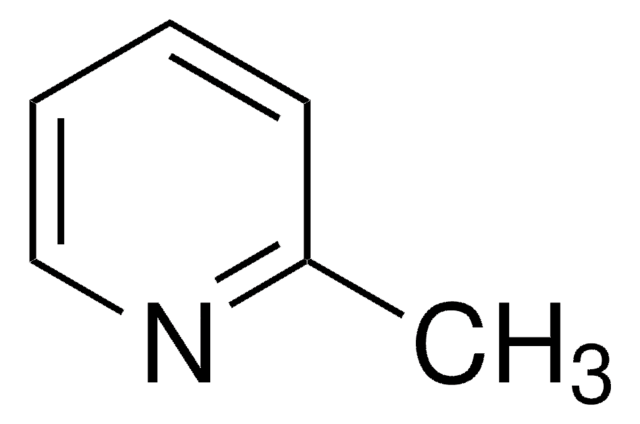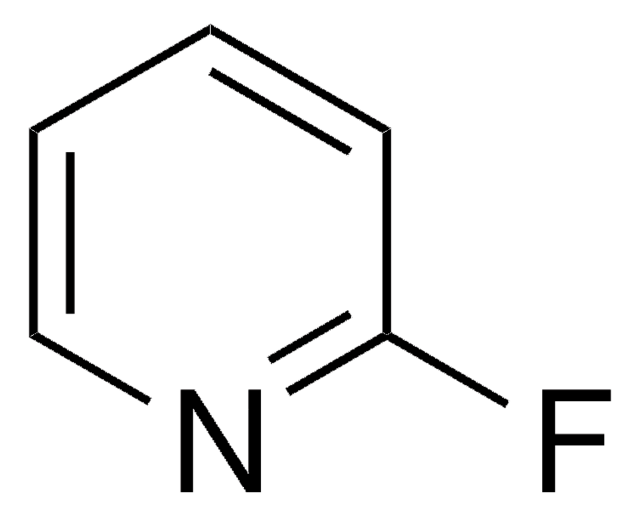All Photos(2)
About This Item
Empirical Formula (Hill Notation):
C7H9N
CAS Number:
Molecular Weight:
107.15
Beilstein:
106480
EC Number:
MDL number:
UNSPSC Code:
12352100
PubChem Substance ID:
NACRES:
NA.22
Recommended Products
Quality Level
Assay
97%
refractive index
n20/D 1.496 (lit.)
bp
149 °C (lit.)
density
0.937 g/mL at 25 °C (lit.)
SMILES string
CCc1ccccn1
InChI
1S/C7H9N/c1-2-7-5-3-4-6-8-7/h3-6H,2H2,1H3
InChI key
NRGGMCIBEHEAIL-UHFFFAOYSA-N
Looking for similar products? Visit Product Comparison Guide
Related Categories
General description
2-Ethylpyridine linked with silica is a popular stationary phase for chiral and achiral separations in supercritical fluid chromatography.
Application
2-Ethylpyridine is used to study its effect on the proliferation and survival of human umbilical vein endothelial cells (HUVECs), HMVECs from lung, and NIH 3T3 cells.
Signal Word
Warning
Hazard Statements
Precautionary Statements
Hazard Classifications
Acute Tox. 4 Dermal - Acute Tox. 4 Inhalation - Eye Irrit. 2 - Flam. Liq. 3 - Skin Irrit. 2 - STOT SE 3
Target Organs
Respiratory system
Storage Class Code
3 - Flammable liquids
WGK
WGK 1
Flash Point(F)
102.2 °F - closed cup
Flash Point(C)
39 °C - closed cup
Personal Protective Equipment
dust mask type N95 (US), Eyeshields, Gloves
Choose from one of the most recent versions:
Already Own This Product?
Find documentation for the products that you have recently purchased in the Document Library.
Customers Also Viewed
E J O'Loughlin et al.
Biodegradation, 10(2), 93-104 (1999-08-31)
A bacterium capable of degrading 2-methylpyridine was isolated by enrichment techniques from subsurface sediments collected from an aquifer located at an industrial site that had been contaminated with pyridine and pyridine derivatives. The isolate, identified as an Arthrobacter sp., was
S Muthu et al.
Spectrochimica acta. Part A, Molecular and biomolecular spectroscopy, 93, 214-222 (2012-04-07)
Fourier transform Raman and Fourier transform infrared spectra of 2-ethylpyridine-4-carbothioamide were recorded in the regions 3600-100 cm(-1) and 4000-450 cm(-1), respectively in the solid phase. 2-Ethylpyridine-4-carbothioamide is used as anti-tubercular agent that inhibits mycolic acid synthesis. The equilibrium geometry harmonic
David Speybrouck et al.
Current topics in medicinal chemistry, 12(11), 1250-1263 (2012-05-11)
Supercritical fluid (SF) was discovered 200 years ago, but the use of this fluid as a mobile phase in chromatography only became popular fifty years ago. The development of the supercritical fluid chromatography (SFC) was progressing slowly due to technological
Cleidiane G Zampronio et al.
The Analyst, 127(8), 1054-1060 (2002-08-28)
Direct sampling tandem mass spectrometry (MS/MS) was used for the quantitation of mixtures of the isomers 2-, 3- and 4-ethyl pyridine. The similarity between the analytes and the second-order nature of MS/MS data require the use of multivariate calibration techniques
Russell Bazemore et al.
Journal of agricultural and food chemistry, 54(2), 497-501 (2006-01-19)
Following smoking 1/2 of a cigar, the most odorous cigar tobacco smoke components extracted from the surface of the tongue by nylon-meshed swabs and then extracted from the swab headspace by solid phase microextraction were ethyl pyrrole, 2,3-dimethyl pyrazine, and
Our team of scientists has experience in all areas of research including Life Science, Material Science, Chemical Synthesis, Chromatography, Analytical and many others.
Contact Technical Service











